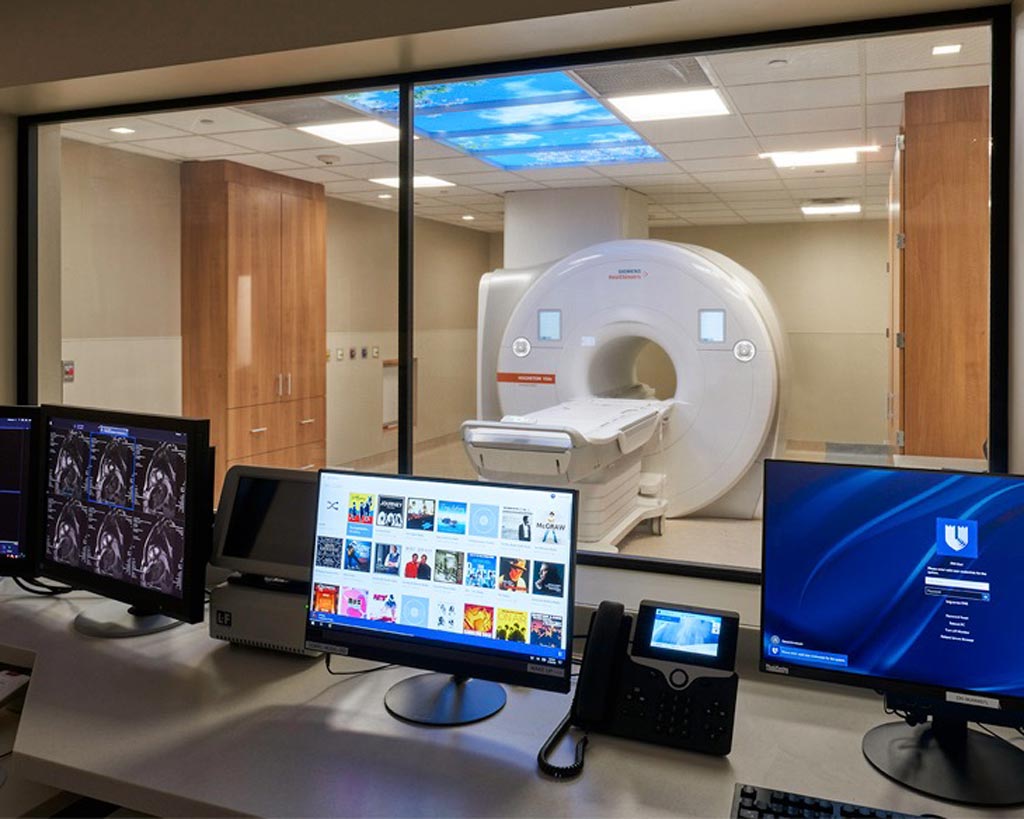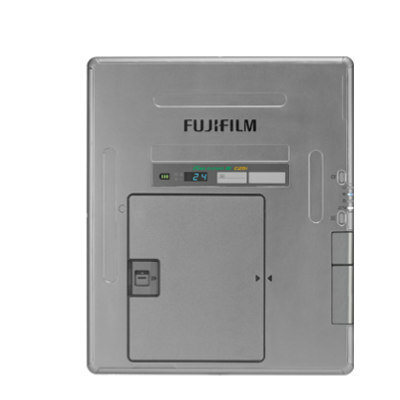MRI Cardiac Stress Test Could Help Identify CAD Severity
|
By MedImaging International staff writers Posted on 20 Feb 2019 |

Image: A new study suggests that cardiac magnetic resonance (CMR) could serve as a non-invasive, non-toxic alternative for identifying the extent of coronary artery disease (CAD) (Photo courtesy of Duke Health).
Researchers at Northwestern University (NU; Chicago, IL, USA), Heart Imaging Technologies (Durham, NC, USA), Duke University (Durham NC, USA), and other institutions conducted a study involving 9,151 patients (median age 63 years, 55% men) undergoing clinical evaluation of myocardial ischemia, in order to determine if stress CMR is associated with patient mortality. An automated process collected data from finalized clinical reports, aggregated the data, and assessed all-cause patient mortality via the US Social Security Death Index.
The results revealed that 4,408 patients had a normal stress CMR examination, 4,743 had an abnormal examination, and 1,517 died during a median follow-up time of five years. Analysis revealed that for low-risk patients without prior history of heart disease, those with an abnormal CMR scan were 3.4 times more likely to die compared to patients with a normal CMR scan. The strong association between an abnormal stress CMR and mortality held even after adjusting for patient age, sex, and cardiac risk factors. The study was published on February 8, 2019, in JAMA Cardiology.
“CMR works as well or better than other exams at identifying heart wall motion, cell death, and the presence of low blood flow. There are a number of reasons for the limited use of stress CMR, including availability of good quality laboratories, exclusion of patients who cannot undergo magnetization, and a lack of data on patient outcomes,” said senior author Robert Judd, PhD, of Duke University. “With the findings from this study suggesting that stress CMR is effective in predicting mortality, we provide a strong basis for a head-to-head study between stress CMR and other modalities.”
Stress CMR perfusion is increasingly being used to test for inducible myocardial ischemia and has been well validated against other imaging modalities such as invasive angiography or fractional flow reserve (FFR). The majority of scans are performed using a stress/rest protocol using adenosine as the stressor, which acts to induce ischemia in the myocardium. Some centers use inotrope dobutamine to stress the heart, and the images are interpreted in a similar fashion to dobutamine stress echocardiogram.
Related Links:
Northwestern University
Heart Imaging Technologies
Duke University
The results revealed that 4,408 patients had a normal stress CMR examination, 4,743 had an abnormal examination, and 1,517 died during a median follow-up time of five years. Analysis revealed that for low-risk patients without prior history of heart disease, those with an abnormal CMR scan were 3.4 times more likely to die compared to patients with a normal CMR scan. The strong association between an abnormal stress CMR and mortality held even after adjusting for patient age, sex, and cardiac risk factors. The study was published on February 8, 2019, in JAMA Cardiology.
“CMR works as well or better than other exams at identifying heart wall motion, cell death, and the presence of low blood flow. There are a number of reasons for the limited use of stress CMR, including availability of good quality laboratories, exclusion of patients who cannot undergo magnetization, and a lack of data on patient outcomes,” said senior author Robert Judd, PhD, of Duke University. “With the findings from this study suggesting that stress CMR is effective in predicting mortality, we provide a strong basis for a head-to-head study between stress CMR and other modalities.”
Stress CMR perfusion is increasingly being used to test for inducible myocardial ischemia and has been well validated against other imaging modalities such as invasive angiography or fractional flow reserve (FFR). The majority of scans are performed using a stress/rest protocol using adenosine as the stressor, which acts to induce ischemia in the myocardium. Some centers use inotrope dobutamine to stress the heart, and the images are interpreted in a similar fashion to dobutamine stress echocardiogram.
Related Links:
Northwestern University
Heart Imaging Technologies
Duke University
Latest MRI News
- Low-Cost Whole-Body MRI Device Combined with AI Generates High-Quality Results
- World's First Whole-Body Ultra-High Field MRI Officially Comes To Market
- World's First Sensor Detects Errors in MRI Scans Using Laser Light and Gas
- Diamond Dust Could Offer New Contrast Agent Option for Future MRI Scans
- Combining MRI with PSA Testing Improves Clinical Outcomes for Prostate Cancer Patients
- PET/MRI Improves Diagnostic Accuracy for Prostate Cancer Patients
- Next Generation MR-Guided Focused Ultrasound Ushers In Future of Incisionless Neurosurgery
- Two-Part MRI Scan Detects Prostate Cancer More Quickly without Compromising Diagnostic Quality
- World’s Most Powerful MRI Machine Images Living Brain with Unrivaled Clarity
- New Whole-Body Imaging Technology Makes It Possible to View Inflammation on MRI Scan
- Combining Prostate MRI with Blood Test Can Avoid Unnecessary Prostate Biopsies
- New Treatment Combines MRI and Ultrasound to Control Prostate Cancer without Serious Side Effects
- MRI Improves Diagnosis and Treatment of Prostate Cancer
- Combined PET-MRI Scan Improves Treatment for Early Breast Cancer Patients
- 4D MRI Could Improve Clinical Assessment of Heart Blood Flow Abnormalities
- MRI-Guided Focused Ultrasound Therapy Shows Promise in Treating Prostate Cancer
Channels
Radiography
view channel
Novel Breast Imaging System Proves As Effective As Mammography
Breast cancer remains the most frequently diagnosed cancer among women. It is projected that one in eight women will be diagnosed with breast cancer during her lifetime, and one in 42 women who turn 50... Read more
AI Assistance Improves Breast-Cancer Screening by Reducing False Positives
Radiologists typically detect one case of cancer for every 200 mammograms reviewed. However, these evaluations often result in false positives, leading to unnecessary patient recalls for additional testing,... Read moreUltrasound
view channel.jpg)
Diagnostic System Automatically Analyzes TTE Images to Identify Congenital Heart Disease
Congenital heart disease (CHD) is one of the most prevalent congenital anomalies worldwide, presenting substantial health and financial challenges for affected patients. Early detection and treatment of... Read more
Super-Resolution Imaging Technique Could Improve Evaluation of Cardiac Conditions
The heart depends on efficient blood circulation to pump blood throughout the body, delivering oxygen to tissues and removing carbon dioxide and waste. Yet, when heart vessels are damaged, it can disrupt... Read more
First AI-Powered POC Ultrasound Diagnostic Solution Helps Prioritize Cases Based On Severity
Ultrasound scans are essential for identifying and diagnosing various medical conditions, but often, patients must wait weeks or months for results due to a shortage of qualified medical professionals... Read moreNuclear Medicine
view channel
New PET Biomarker Predicts Success of Immune Checkpoint Blockade Therapy
Immunotherapies, such as immune checkpoint blockade (ICB), have shown promising clinical results in treating melanoma, non-small cell lung cancer, and other tumor types. However, the effectiveness of these... Read moreNew PET Agent Rapidly and Accurately Visualizes Lesions in Clear Cell Renal Cell Carcinoma Patients
Clear cell renal cell cancer (ccRCC) represents 70-80% of renal cell carcinoma cases. While localized disease can be effectively treated with surgery and ablative therapies, one-third of patients either... Read more
New Imaging Technique Monitors Inflammation Disorders without Radiation Exposure
Imaging inflammation using traditional radiological techniques presents significant challenges, including radiation exposure, poor image quality, high costs, and invasive procedures. Now, new contrast... Read more
New SPECT/CT Technique Could Change Imaging Practices and Increase Patient Access
The development of lead-212 (212Pb)-PSMA–based targeted alpha therapy (TAT) is garnering significant interest in treating patients with metastatic castration-resistant prostate cancer. The imaging of 212Pb,... Read moreGeneral/Advanced Imaging
view channelBone Density Test Uses Existing CT Images to Predict Fractures
Osteoporotic fractures are not only devastating and deadly, especially hip fractures, but also impose significant costs. They rank among the top chronic diseases in terms of disability-adjusted life years... Read more
AI Predicts Cardiac Risk and Mortality from Routine Chest CT Scans
Heart disease remains the leading cause of death and is largely preventable, yet many individuals are unaware of their risk until it becomes severe. Early detection through screening can reveal heart issues,... Read moreImaging IT
view channel
New Google Cloud Medical Imaging Suite Makes Imaging Healthcare Data More Accessible
Medical imaging is a critical tool used to diagnose patients, and there are billions of medical images scanned globally each year. Imaging data accounts for about 90% of all healthcare data1 and, until... Read more
Global AI in Medical Diagnostics Market to Be Driven by Demand for Image Recognition in Radiology
The global artificial intelligence (AI) in medical diagnostics market is expanding with early disease detection being one of its key applications and image recognition becoming a compelling consumer proposition... Read moreIndustry News
view channel
Hologic Acquires UK-Based Breast Surgical Guidance Company Endomagnetics Ltd.
Hologic, Inc. (Marlborough, MA, USA) has entered into a definitive agreement to acquire Endomagnetics Ltd. (Cambridge, UK), a privately held developer of breast cancer surgery technologies, for approximately... Read more
Bayer and Google Partner on New AI Product for Radiologists
Medical imaging data comprises around 90% of all healthcare data, and it is a highly complex and rich clinical data modality and serves as a vital tool for diagnosing patients. Each year, billions of medical... Read more



















